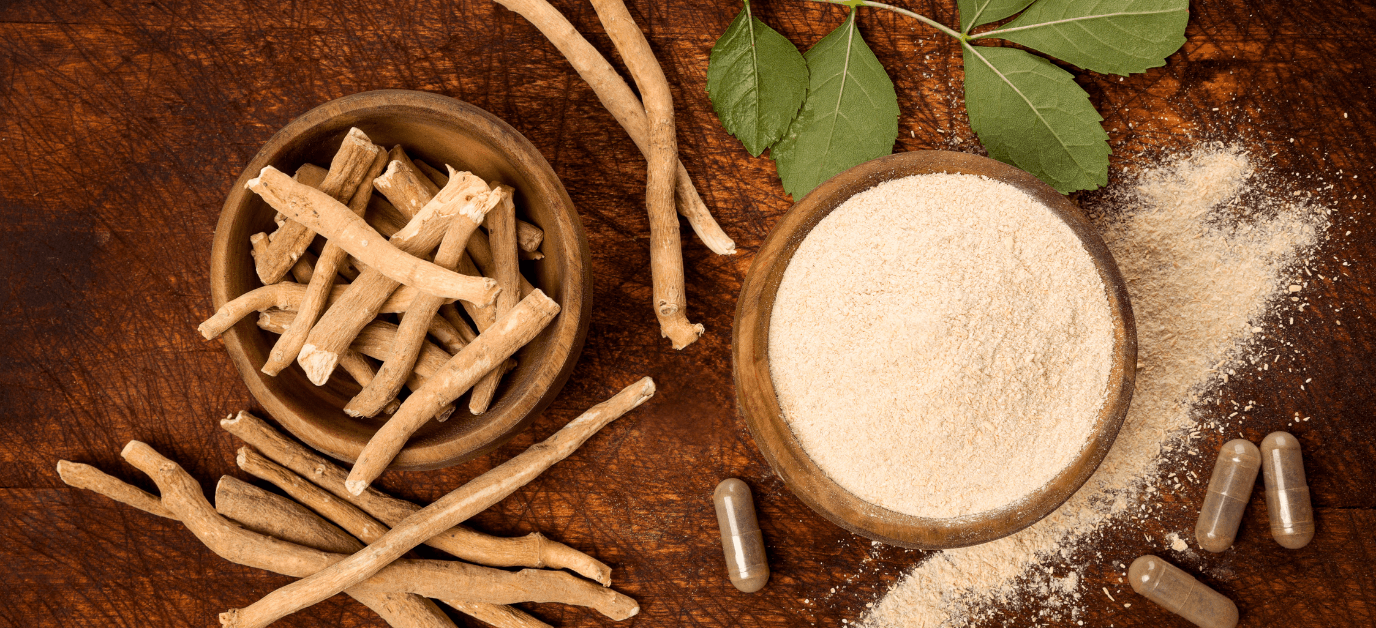

What are the benefits of ashwagandha?
05.06.2025Recommended products
What Is Ashwagandha?
Ashwagandha [1] is herb with yellow flowers that is native to Southeast Asia. It is an adaptogen (medicinal plant) that helps the body adapt to stress and promote general well-being. Research suggests that ashwagandha can reduce stress, increase cognitive function, improve sleep, support immunity, improve sexual function and, normalise metabolic function.

What are the benefits of ashwagandha?
Ashwagandha has been used for thousands of years in traditional medicine. Several herbal remedies are made using the roots and leaves of the plant. That said, scientific research into ashwagandha is recent. Since the early 20th century, studies [2] have found that ashwagandha has many compounds offering a range of health benefits.
Plant medicines typically have biologically active compounds. The compounds in ashwagandha [3] include withaferin and other withanolides that have potent antioxidant properties. These compounds [3] are also known for neuroprotective and anti-inflammatory effects.

The antioxidant [4] properties of ashwagandha include phenolic compounds like flavonoids. These bioactive compounds help to neutralise free radicals. Free radicals are unstable molecules that cause damage at a cellular level.
Insofar, research [4] has found that the antioxidant activity of ashwagandha can improve cognitive function. This is because it helps to protect our brain cells from damage caused by oxidative stress. Oxidative [5] stress is a result of chronic stress which offsets our HPA axis and leads to elevated levels of cortisol and serotonin.
Cortisol and serotonin are the hormones involved in our stress response and regulation of mood. Ashwagandha [6] works to decrease the levels of these hormones concurrently. It also promotes the development of new neural pathways. This can improve [7] memory and attention, as well as counteracting cognitive and perceived stress and experiences of anxiety.

Similarly, the calming effects of ashwagandha have proven to improve [8] sleep quality and experiences of insomnia. This is because ashwagandha influences the GABA [9] neurotransmitter in our brain. It may also help to increase levels of melatonin - the hormone responsible for our sleep-wake cycles. As a result, ashwagandha [10] can promote sleep and drowsiness and help to regulate our sleep cycles.
Traditional medicine has long utilised the anti-inflammatory properties of ashwagandha to support the immune system. Newer research has noted the role of it for disease [11] prevention. This is because ashwagandha [12] reduces inflammatory activity by inhibiting inflammation pathways and decreasing pro-inflammatory cytokines. Therefore, it is particularly beneficial [13] in inflammatory diseases such as heart disease, diabetes, and cancer.

On a related note, evidence suggests that ashwagandha [14] can reduce the risk of heart disease. Its cardioprotective effects are a result of significant decreases in serum cholesterol, triglycerides, and LDL (low-density lipoproteins) and VLDL (very low-density lipoproteins) cholesterol. Lower cholesterol levels are also related to increased levels of maximum oxygen consumption (VO2max [15]).
VO2max is a measure of cardio-respiratory endurance. Enhancing the body’s ability to transport and utilise oxygen appropriately can increase our strength and endurance. Research [16] has found that supplementing ashwagandha can improve cardiorespiratory fitness, power, and recovery in healthy active adults.

In addition, ashwagandha may improve sexual function in females and testosterone levels in males [17]. This is because its apoptogenic effects can help to balance our sex hormones. As a result, ashwagandha is associated with improved sexual function and sexual health markers.
Finally, there is evidence [18] that ashwagandha supports metabolic function and weight management. Its antioxidant and anti-inflammatory properties aid protein synthesis and enhance mitochondrial activity. This leads to increased basal metabolic rate, energy production, and energy expenditure. As a result, ashwagandha can improve lipid profiles and insulin sensitivity which contributes to more calories burned at rest.

How much ashwagandha should you take?
Ashwagandha is available in many forms. These include powder, tablets, gummies, capsules, and liquid extracts. While there is no official recommended amount of ashwagandha, most research [19] suggests that effective doses are between 250-600mg per day. That said, it is important to note that you should always consult your GP before introducing new supplements.
Sources:
[1]https://ods.od.nih.gov/factsheets/Ashwagandha-HealthProfessional/
[2]https://nutritionandmetabolism.biomedcentral.com/articles/10.1186/s12986-025-00902-7
[3]https://pmc.ncbi.nlm.nih.gov/articles/PMC7441797/#:~:text=Withania%20somnifera%20(Ashwagandha)%20is%20one,of%20SARS%2DCoV%2D2.
[4]https://www.frontiersin.org/journals/nutrition/articles/10.3389/fnut.2024.1439294/full
[5]https://pmc.ncbi.nlm.nih.gov/articles/PMC8470444/
[6]https://pubmed.ncbi.nlm.nih.gov/37832082/
[7]https://pmc.ncbi.nlm.nih.gov/articles/PMC11207027/#:~:text=Ashwagandha%20has%20also%20been%20reported,stressful%20conditions%20who%20might%20benefit.
[8]https://pmc.ncbi.nlm.nih.gov/articles/PMC11207027/#:~:text=Ashwagandha%20has%20also%20been%20reported,stressful%20conditions%20who%20might%20benefit.
[9]https://pmc.ncbi.nlm.nih.gov/articles/PMC9007714/
[10]https://pmc.ncbi.nlm.nih.gov/articles/PMC8462692/
[11]https://health.clevelandclinic.org/what-is-ashwagandha
[12]https://pmc.ncbi.nlm.nih.gov/articles/PMC11314093/#:~:text=This%20review%20examines%20the%20impact,act%20in%20the%20human%20body.
[13]https://pmc.ncbi.nlm.nih.gov/articles/PMC10147008/#:~:text=The%20highest%20dose%20administered%20(10,NF%2D%20%CE%BAB%20%5B21%5D.
[14]https://pmc.ncbi.nlm.nih.gov/articles/PMC11314093/
[15]https://pmc.ncbi.nlm.nih.gov/articles/PMC3545242/#:~:text=This%20study%20was%20designed%20to,of%20this%20supplementation%20by%20athletes.&text=After%20the%20eight%2Dweek%20supplementation,the%20ergogenic%20effect%20of%20Ashwagandha.
[16]https://pmc.ncbi.nlm.nih.gov/articles/PMC8006238/#:~:text=WS%20root%20extract%20increases%20cardiorespiratory,life%20in%20healthy%20athletic%20adults.&text=(300%20b.i.d.)&text=WS%20supplementation%20during%20a%20resistance,exercise%20recovery%20in%20untrained%20subjects.&text=WS%20supplementation%20for%2028%20days,cardiorespiratory%20capacity%20in%20healthy%20men.&text=WS%20supplementation%20(500%20mg%C2%B7day,recovery%20in%20recreationally%20active%20subjects.
[17]https://www.researchsquare.com/article/rs-3675567/v1
[18]https://pmc.ncbi.nlm.nih.gov/articles/PMC11314093/#:~:text=Further%20research%20has%20shown%20that,fat%20and%20improve%20lipid%20profiles.
[19]https://ods.od.nih.gov/factsheets/Ashwagandha-HealthProfessional/


